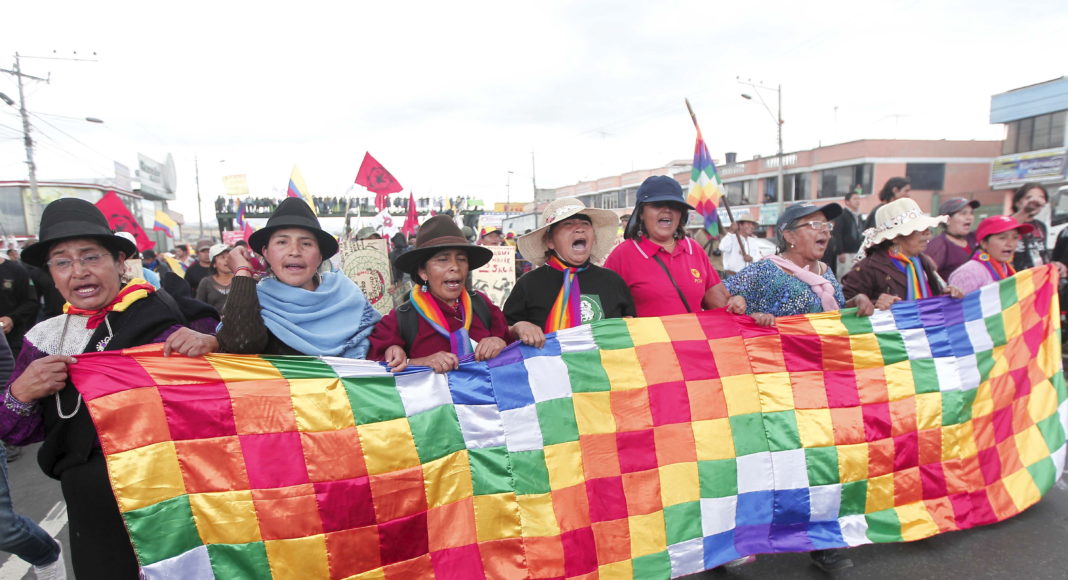A government announcement that the Ecuadorian economy is in recession, and that official growth estimates for 2015 are putting further pressure on President Rafael Correa’s government, at a time when he is seeking constitutional changes to enable him to stand as a candidate for an unprecedented fourth term in office in elections due to be held in February 2017.
Since coming to power in 2007 President Rafael Correa has faced challenges from many different sectors in Ecuadorian society.
In 2010 his government came under extreme pressure when people took to the streets protesting, blocking roads and seizing significant public buildings amid anger at cuts to benefits for public servants- leading to Correa’s kidnapping and hospitalisation.
Correa branded these events as a coup attempt led by sections of the armed forces and police and declared a state of emergency.
Despite these challenges, President Correa has usually managed to maintain support, mainly from the poorer sectors of Ecuadorian society, due to his successful efforts to reduce poverty and unemployment rates as well as improve infrastructure and build more hospitals and schools.
However, in the second half of 2015 the Ecuadorian leader is once again facing increasing protests that could threaten his grip on power.
On 2 August around 10,000 indigenous protesters marched for 400km from the Amazonian province of Zamora Chinchipe to the capital Quito, on what they’ve called the “march for democracy and dignity.”
The leaders of different indigenous groups signed and marched with the “Mandate of the peoples of Cordillera del Cóndor”, a document critical of the constitutional amendments proposed by Correa and his PAIS Alianza party.
 The most significant of these amendments is Correa’s plan to eliminate presidential term limits meaning that he could continue to serve the country indefinitely- under current legislation he is unable to stand for re-election.
The most significant of these amendments is Correa’s plan to eliminate presidential term limits meaning that he could continue to serve the country indefinitely- under current legislation he is unable to stand for re-election.
The dissatisfaction from the indigenous groups will come as no surprise for the Ecuadorian president after previous demonstrations and rallies made evident their concerns about resource extraction and mining.
Despite the president’s argument that mining is necessary for creating revenue in modern Ecuador, the indigenous groups claim that they are never consulted about development of their territories, are frequently displaced from their ancestral homes, and the land is left damaged by the open-cast mines funded through Chinese investment.
But proposals for constitutional change have brought together usually polarised sides of Ecuadorian politics and Correa is now facing grievances from new sectors of Ecuadorean society.
Middle class Ecuadorians and conservatives are arguing against rises in inheritance tax; members of medical associations are standing against a government-run agency installed to monitor healthcare quality, arguing instead for an independent body; and retirees disapprove of Correa’s plans to cut contributions to pension funds.
In January 2015 President Correa warned that this would be a difficult year economically after oil revenues, which make up for over half of the country’s exports, fell drastically. This comes as little comfort for Ecuadorians facing cuts on public spending, austerity and intrusive international investment and resource extraction.
Despite the increasing calls for Correa’s resignation, it is unlikely that he will be removed from power by popular protests any time soon. In the past, Ecuador’s indigenous movements have proven to be a significant force in the removals of previous presidents but the case of Correa is different since any attempt to remove him from office is likely to fail without military support.
Unlike during the unrest of2010, itappears that on this occasion, the military are among the few who continue to benefit from the stability and social gains of Correa’s government. With the military on his side, any attempts to overthrow Correa seem likely to fail.
The proposal to remove limits on the number of consecutive presidential terms is to be voted on in December in the National Assembly, which is dominated by members of his PAIS Alianza party.
Even if he is successful in this initiatve, President Correa can expect further strike action and public demonstrations against his government, unless the economy recovers and he is able to continue with his ambitious social policies.

